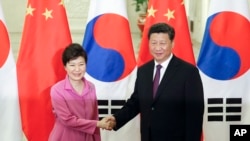Reaffirming their commitment to the denuclearization of the Korean peninsula, South Korean President Park Geun-hye and Chinese President Xi Jinping are calling for a quick resumption of the six-party talks about the issue.
They cited international efforts that produced a nuclear deal between Iran and world powers, including the United States.
The two leaders agree that a nuclear accord reached in 2005 and calling for a verifiable denuclearization of the Korean peninsula should be faithfully implemented, according to Park’s office.
Park, who is on a three-day visit to China to attend 70th anniversary celebrations marking the end of World War II, met Xi in Beijing's Great Hall of the People.
The leaders warned against any actions that could escalate tensions on the Korean peninsula.
Effort to ease tension
The warning came several days after a military standoff between the two Koreas over North Korea’s alleged land mine attack against South Korean soldiers. The two sides came close to the brink of military conflict before North Korea reached out to the South to offer talks.
South Korean news media speculated that North Korea’s aggression angered China, which may have pressed its ally to pull back from the standoff.
Park is quoted as telling Xi, “I would like to thank China for its constructive role in closely communicating with us in order to resolve the latest tension on the Korean Peninsula."
The United States welcomed the move.
“The United States is committed to working with its partners and allies in the region to achieve consensus on the terms for authentic and credible negotiations to implement the September 2005 Joint Statement,” said Katina Adams, a State Department spokesperson.
North Korea warned on provocation
Analysts in Seoul say the meeting in Beijing serves as an indirect rebuke to North Korea for its recent aggression.
“The warning is practically a shared consensus on North Korea by the two leaders. This will make it difficult for North Korea to stage additional provocations,” said Nam Kwang-gyu, a professor at Seoul-based Korea University.
“If North Korea protests China’s warning and stages further provocations, such as a fourth nuclear test or a long-range missile launch, the relationship would be damaged to the degree that it couldn’t be easily restored,” said Nam.
South Korea-China relations
Recently, South Korea and China have appeared to move closer. Park is to attend a high-profile military parade Thursday in which China is expected to showcase its military power and newly developed weapons.
Park will be the only leader of a major U.S. ally to attend the parade.
Min Kyung-wook, a Park spokesman, told reporters last week that South Korea considered its relationship with China, Seoul's largest trading partner, in its decision to attend the parade.
Concern over alliance
South Korea and China also are forming common ground against Japan over Tokyo's past aggressions, putting the United States in a difficult position between its two main allies in Asia, Japan and South Korea.
“Looking at history, our two peoples’ struggle has been very similar in our quest to liberate our people,” Xi said in his opening remarks at the summit.
“As the two countries together underwent a time of great adversity during the past century, such history has become a precious foundation for the friendship of both nations,” Park responded.
Washington dismissed concerns about friendly ties between China and South Korea. “We believe that good relations among countries in the region promote peace and stability and are in their interests and in the interests of the United States,” said Adams.
North Korean leader Kim Jong Un skipped the parade, sending one of his closest aides, Choe Ryong Hae.
Jee Abbey Lee contributed to this report, which was produced in collaboration with VOA's Korean service.




